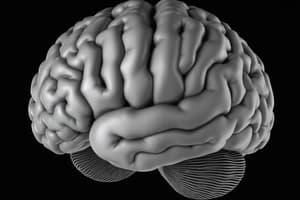Podcast
Questions and Answers
What happens to the flow of cerebrospinal fluid in the brain during sleep?
What happens to the flow of cerebrospinal fluid in the brain during sleep?
- It increases and flushes out waste products (correct)
- It decreases and accumulates waste products
- It remains constant and does not affect waste products
- It stops entirely, leading to waste accumulation
What is the impact of slow wave sleep on learning?
What is the impact of slow wave sleep on learning?
- It helps consolidate learning (correct)
- It causes memory loss
- It disrupts the learning process
- It has no effect on learning
What type of memory task showed improvement after a 1-hour nap?
What type of memory task showed improvement after a 1-hour nap?
- Semantic memory task
- Episodic memory task
- Non-declarative memory task
- Declarative memory task (correct)
What type of improvement was observed during REM sleep?
What type of improvement was observed during REM sleep?
What was the impact of deep sleep on hippocampal activation during the navigation task?
What was the impact of deep sleep on hippocampal activation during the navigation task?
What is the evidence that the sleeping brain is rehearsing information acquired during the previous day?
What is the evidence that the sleeping brain is rehearsing information acquired during the previous day?
Flashcards are hidden until you start studying
Study Notes
Sleep and Brain Function
- During sleep, the flow of cerebrospinal fluid in the brain increases, allowing for the removal of waste products that can interfere with brain function.
Sleep and Learning
- Slow wave sleep plays a crucial role in consolidating memories, enhancing learning, and improving retention.
- A 1-hour nap has been shown to improve performance on creative problem-solving tasks that require insightful solutions.
Memory Consolidation During REM Sleep
- During REM sleep, the brain replays and consolidates memories, strengthening the connections between neurons and enhancing memory retention.
- Improvement in spatial memory was observed during REM sleep, indicating that the brain refines and strengthens spatial memories during this stage.
Hippocampal Activation During Deep Sleep
- Deep sleep has been shown to decrease hippocampal activation during the navigation task, indicating that the brain replays and consolidates spatial memories during this stage.
Rehearsal of Information During Sleep
- The sleeping brain has been found to replay and rehearse information acquired during the previous day, strengthening memories and improving retention.
- This rehearsal process helps to solidify memories and improve learning outcomes.
Studying That Suits You
Use AI to generate personalized quizzes and flashcards to suit your learning preferences.



